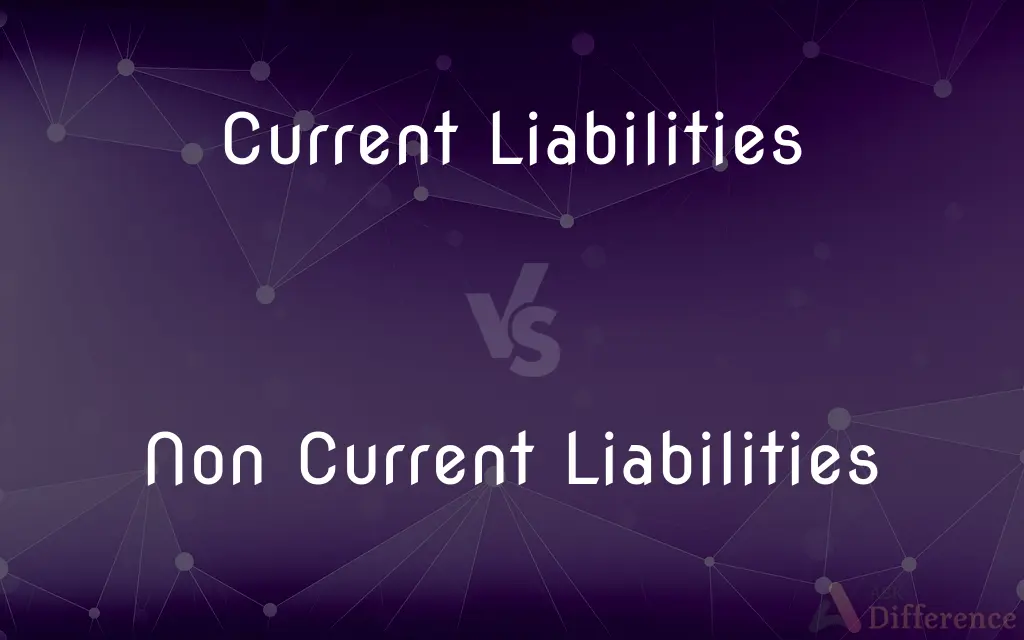Current Liabilities vs. Non Current Liabilities — What's the Difference?
By Tayyaba Rehman — Published on October 14, 2023
Current Liabilities are debts payable within one year, while Non-Current Liabilities are obligations due beyond a year.

Difference Between Current Liabilities and Non Current Liabilities
Table of Contents
ADVERTISEMENT
Key Differences
In a business’s financial statement, Current Liabilities are obligations that need to be settled within a fiscal year or the operating cycle. These are generally paid by utilizing current assets. Conversely, Non-Current Liabilities refer to the debts or obligations that are payable over a term exceeding one year or the business's operational cycle, implying a longer-term obligation.
Current Liabilities play a pivotal role in understanding a company’s short-term financial health and liquidity, reflecting the firm’s ability to meet its immediate obligations. Non-Current Liabilities, however, offer insights into the company’s long-term financial strategy and its ability to ensure financial sustainability and meet its long-term debts, like bonds or lease obligations.
Focusing on Current Liabilities, it's vital to manage these effectively to maintain smooth operational functionality since these are related to day-to-day operational expenses, like accounts payable or short-term loans. In contrast, Non-Current Liabilities have less immediate impact on daily operations but are crucial for long-term strategic planning, due to their impact on the company’s long-term solvency and investment capabilities.
Analyzing Current Liabilities enables stakeholders to gauge a firm’s short-term fiscal health, involving elements like working capital which plays a pivotal role in daily operational financing. Meanwhile, when it comes to Non-Current Liabilities, stakeholders explore a firm’s long-term solvency and its strategic approach towards maintaining sustainability, involving debts like mortgages or long-term lease obligations.
Moreover, Current Liabilities often necessitate the conversion of other current assets into cash to settle short-term debts. Simultaneously, Non-Current Liabilities are typically serviced through the income generated by the business over the years, involving less immediate pressure on the company’s asset liquidity but impacting its long-term financial structure.
ADVERTISEMENT
Comparison Chart
Time Frame
Payable within one year
Due beyond one year
Impact on Operations
Directly related to day-to-day operations
Less immediate impact on daily operations
Management Implication
Require effective short-term financial management
Imply long-term strategic financial planning
Utilization of Assets
Often involve converting current assets into cash
Serviced through long-term earnings
Example
Accounts payable, short-term loans
Mortgages, bonds
Compare with Definitions
Current Liabilities
Debts due within a single operating cycle.
The company’s Current Liabilities included numerous vendor payments.
Non Current Liabilities
Debts due in a timeframe exceeding one year.
The firm secured a loan categorized under Non-Current Liabilities.
Current Liabilities
Short-term financial obligations.
Current Liabilities were meticulously managed to ensure smooth operations.
Non Current Liabilities
Obligations reflective of long-term financial strategy.
Analysts dissected the Non-Current Liabilities to gauge future solvency.
Current Liabilities
Liabilities settled using current assets.
Sufficient current assets enabled settling Current Liabilities effectively.
Non Current Liabilities
Liabilities with a longer-term repayment schedule.
The business's Non-Current Liabilities included several long-term leases.
Current Liabilities
Debts influencing short-term financial health.
Escalating Current Liabilities raised concerns regarding liquidity.
Non Current Liabilities
Debts not impacting immediate liquidity.
Their Non-Current Liabilities were carefully balanced with long-term investments.
Current Liabilities
Obligations typically paid within a year.
Their Current Liabilities considerably increased during the fiscal year.
Non Current Liabilities
Obligations not requiring settlement within the operating cycle.
Non-Current Liabilities were structured to support long-term growth.
Common Curiosities
How are Non-Current Liabilities defined?
Non-Current Liabilities refer to debts or obligations due beyond one year.
Can Current Liabilities impact a company’s liquidity?
Yes, Current Liabilities directly influence a company’s liquidity as they require short-term settlement.
What are Current Liabilities?
Current Liabilities are debts or obligations of a business due within one year.
Can Non-Current Liabilities include bonds?
Yes, bonds are a common example of Non-Current Liabilities as they generally mature beyond one year.
How do Current Liabilities impact daily operations?
Current Liabilities directly influence daily operations due to their short-term nature and impact on working capital.
How do Non-Current Liabilities affect a company’s asset structure?
Non-Current Liabilities can influence a company’s long-term asset structure and capital allocation due to their extended repayment timeframe.
What role do Non-Current Liabilities play in long-term planning?
Non-Current Liabilities impact long-term financial stability, solvency, and strategic investment planning of a business.
What are examples of Current Liabilities?
Examples include accounts payable, short-term loans, and other debts due within one year.
Share Your Discovery

Previous Comparison
Aztecs vs. Mayans
Next Comparison
Bank Rate vs. Repo RateAuthor Spotlight
Written by
Tayyaba RehmanTayyaba Rehman is a distinguished writer, currently serving as a primary contributor to askdifference.com. As a researcher in semantics and etymology, Tayyaba's passion for the complexity of languages and their distinctions has found a perfect home on the platform. Tayyaba delves into the intricacies of language, distinguishing between commonly confused words and phrases, thereby providing clarity for readers worldwide.














































